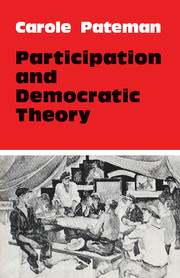Book contents
- Frontmatter
- Contents
- I Recent theories of democracy and the ‘classical myth’
- II Rousseau, John Stuart Mill and G. D. H. Cole: a participatory theory of democracy
- III The sense of political efficacy and participation in the workplace
- IV ‘Participation’ and ‘democracy’ in industry
- V Workers' self-management in Yugoslavia
- VI Conclusions
- Bibliography
- Index
I - Recent theories of democracy and the ‘classical myth’
Published online by Cambridge University Press: 05 August 2014
- Frontmatter
- Contents
- I Recent theories of democracy and the ‘classical myth’
- II Rousseau, John Stuart Mill and G. D. H. Cole: a participatory theory of democracy
- III The sense of political efficacy and participation in the workplace
- IV ‘Participation’ and ‘democracy’ in industry
- V Workers' self-management in Yugoslavia
- VI Conclusions
- Bibliography
- Index
Summary
During the last few years of the 1960s the word ‘participation’ became part of the popular political vocabulary. This took place under the impetus of demands, notably from students, for new areas of participation to be opened up—in this case in the sphere of higher education—and of demands by various groups for the practical implementation of rights of participation that were theirs in theory. In France ‘participation’ was one of the last of De Gaulle's rallying calls; in Britain we have seen the idea given official blessing in the Skeffington Report on planning, and in America the anti-poverty programme included a provision for the ‘maximum feasible participation’ of those concerned. The widespread use of the term in the mass media has tended to mean that any precise, meaningful content has almost disappeared; ‘participation’ is used to refer to a wide variety of different situations by different people. The popularity of the concept provides a good reason for devoting some attention to it, but more importantly, the recent upsurge of demands for more participation raises a central question of political theory; the place of ‘participation’ in a modern, viable theory of democracy.
It is rather ironical that the idea of participation should have become so popular, particularly with students, for among political theorists and political sociologists the widely accepted theory of democracy (so widely accepted that one might call it the orthodox doctrine) is one in which the concept of participation has only the most minimal role.
- Type
- Chapter
- Information
- Participation and Democratic Theory , pp. 1 - 21Publisher: Cambridge University PressPrint publication year: 1970
- 2
- Cited by



